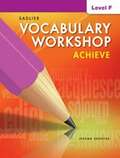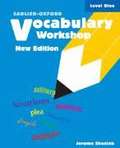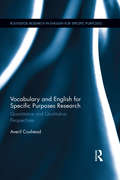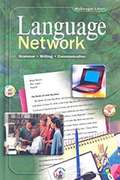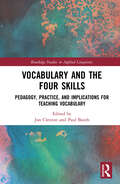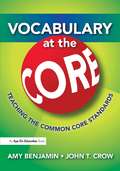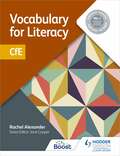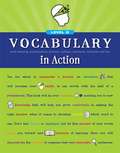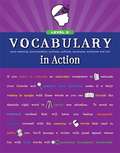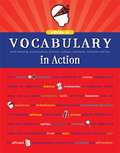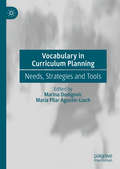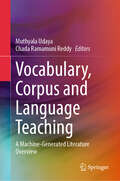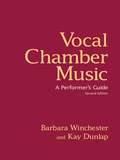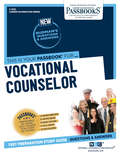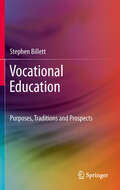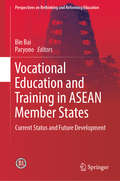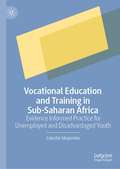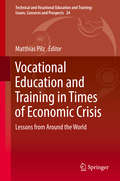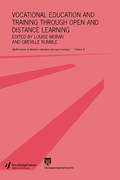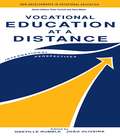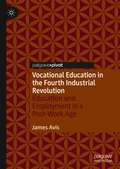- Table View
- List View
Vocabulary Workshop Tools for Excellence Level F
by Jerome ShostakVocabulary Workshop Tools for Excellence Level F
Vocabulary Workshop: Level Blue
by Jerome ShostakProven-successful, research-based vocabulary builder develops excellent reading, spelling, and writing skills.
Vocabulary and English for Specific Purposes Research: Quantitative and Qualitative Perspectives (Routledge Research in English for Specific Purposes)
by Averil CoxheadThis volume provides an important contribution to the study of vocabulary and its relationship to English for Specific Purposes (ESP) research and teaching. Focussing on quantitative and qualitative approaches, this book draws on a wide range of literature to explores key issues that include: how to identify and categorise specialised vocabulary; and the role and value of word list research in English for Academic Purposes (EAP) and ESP. This book features: An analysis of material in a range of different contexts that include secondary school education, pre-university and university-based education, professional and occupational ESP, and the trades. inclusion of many examples of specialised vocabulary from research in Aotearoa/New Zealand and from many other areas in the world. a review of the application of vocabulary research to professional and pedagogical practice suggestions for future directions for research. Written by a leading researcher, Vocabulary and English for Specific Purposes Research provides key reading for those working in this area.
Vocabulary and Spelling Book (Grade #8)
by Mcdougal LittellThe Vocabulary and Spelling Book contains lessons designed to help you understand and remember important vocabulary skills and strategies. You will often need to use basic reference sources to master these new techniques and to complete the exercises within the book.
Vocabulary and the Four Skills: Pedagogy, Practice, and Implications for Teaching Vocabulary (Routledge Studies in Applied Linguistics)
by Jon ClentonThis edited volume provides a single coherent overview of vocabulary teaching and learning in relation to each of the four skills (reading, writing, listening, speaking). Each of the four sections presents a skill area with two chapters presented by two leading experts in the field, relating recent advances in the field to the extent that each skill area relates differently to vocabulary and how this informs pedagogy and policy. The book opens with a summary of recent advances in the field of vocabulary, and closes by drawing conclusions from the skill areas covered. The chapters respond to emerging vocabulary research trends that indicate that lexical acquisition needs to be treated differently according to the skill area. The editors have chosen chapters to respond to recent research advances and to highlight practical and pedagogical application in a single coherent volume.
Vocabulary at the Core: Teaching the Common Core Standards
by Amy Benjamin John T. CrowVocabulary at the Core, the expanded and updated edition of Vocabulary at the Center (© 2009), is the definitive guide for every teacher engaged in helping students learn essential academic vocabulary. In clear, precise language, Benjamin and Crow explain why vocabulary is at the core of all learning and communicating and why word study should play a more significant role in English class and across the curriculum—as emphasized by the Common Core State Standards. You will learn... How words get learned and stay learned. Why teachers must emphasize useful academic words. Why rote memorization doesn’t work and why students need opportunities for deep processing. How and why to teach derivations, collocations, register, idioms, and gender. How and why to teach context clues, fluency, and pronunciation. The benefits of graphic organizers and word games in the classroom. Each chapter includes engaging, easy-to-implement classroom applications that are correlated to the Common Core State Standards and will fit seamlessly into your lesson plans. BONUS! Vocabulary at the Core also provides ideas for formative and summative assessments.
Vocabulary for Literacy: CfE
by Jane Cooper Rachel AlexanderSyllabus: CfE (Curriculum for Excellence, from Education Scotland) and SQALevel: BGE (S1-S3) and Senior Phase (National 4/5)Subject: LiteracyWords are powerful. Enrich your vocabulary and you will be able to speak, listen, read and write more effectively.Explore important aspects of vocabulary - decoding words, easily confused words, groups of words and new words - through simple explanations, strategies, progressive activities and revision tasks.This is the only book available that includes a dedicated chapter on inclusive language, to teach pupils how their words can make people feel accepted and understood.Vocabulary for Literacy equips pupils with the building blocks for success in exams, coursework and adult life, and facilitates literacy development across the curriculum.> Understand the essentials. Key concepts that pupils need to remember are introduced in 'explanation' boxes.> Put theory into practice. 'Building', 'Strengthening' and 'Extending' tasks enable pupils to apply their knowledge and skills, through a mix of solo and group work.> Check and consolidate. 22 photocopiable A-Z activity sheets at the end of the book can be used flexibly for classwork, homework, revision or assessment.> See the big picture. 'Crossover' boxes make links to prior and future learning, knowledge and skills, encouraging pupils to approach vocabulary holistically.> Avoid common errors. 'Mistake' boxes contain examples and tips to ensure that pupils get it right in their own speech and writing."There is a proven link between an improved vocabulary and increased attainment in Scottish schooling."Rachel Alexander
Vocabulary for Literacy: CfE
by Jane Cooper Rachel AlexanderSyllabus: CfE (Curriculum for Excellence, from Education Scotland) and SQALevel: BGE (S1-S3) and Senior Phase (National 4/5)Subject: LiteracyWords are powerful. Enrich your vocabulary and you will be able to speak, listen, read and write more effectively.Explore important aspects of vocabulary - decoding words, easily confused words, groups of words and new words - through simple explanations, strategies, progressive activities and revision tasks.This is the only book available for the Scottish curriculum that includes a dedicated chapter on inclusive language, to show students how their words have the power to make everyone feel accepted and understood.Vocabulary for Literacy equips pupils with the building blocks for success in exams, coursework and adult life, and facilitates literacy development across the curriculum.> Understand the essentials. Key concepts that pupils need to remember are introduced in 'explanation' boxes.> Put theory into practice. 'Building', 'Strengthening' and 'Extending' tasks enable pupils to apply their knowledge and skills, through a mix of solo and group work.> See the big picture. 'Crossover' boxes make links to prior and future learning, knowledge and skills, encouraging pupils to approach vocabulary holistically.> Avoid common errors. 'Mistake' boxes contain examples and tips to ensure that pupils get it right in their own speech and writing.> Check and consolidate. 22 printable A-Z activity sheets (available for free online) can be used in school or at home for revision and extra practice."There is a proven link between an improved vocabulary and increased attainment in Scottish schooling."Rachel Alexander
Vocabulary for the College-Bound Student
by Harold Levine Norman Levine Robert T. LevineTo provide meaningful, organized vocabulary improvement for the high school student whose goals may be college admission, a responsible position, or self-improvement.
Vocabulary for the High School Student (4th edition)
by Harold Levine Norman Levine Robert T. LevineThe principal aim of this updated and enlarged edition is to help high school students build a superior vocabulary and learn the skills of critical thinking, close reading, and concise writing. The exercises in this edition have been written expressly to teach these and other desirable skills at the same time as vocabulary.
Vocabulary in Action (Level D)
by The Editors at the Loyola PressThe book focuses on student's vocabulary development with the choice of words chosen based on frequency, occurrence, and relevance to the real world.
Vocabulary in Action (Level E)
by Loyola PressVocabulary in Action- Vocabulary Workbooks Welcome to the NEW Vocabulary in Action, the premier vocabulary development program! With this comprehensive program, students study and learn hundreds of words that were researched and selected for frequency, occurrence, and relevance to the real world as well as standardized assessment. Consumable student books pair with online resources and teacher instruction to provide vocabulary instruction that is introduced, reinforced, and applied in engaging, systematic ways. The Vocabulary in Action workbook is designed to improve oral and written vocabulary through interactive vocabulary practice, giving students the gift of a larger and more descriptive vocabulary.
Vocabulary in Action (Level H)
by Loyola PressWelcome to the NEW Vocabulary in Action, the premier vocabulary development program! With this comprehensive program, students study and learn hundreds of words that were researched and selected for frequency, occurrence, and relevance to the real world as well as standardized assessment. Consumable student books pair with online resources and teacher instruction to provide vocabulary instruction that is introduced, reinforced, and applied in engaging, systematic ways. The Vocabulary in Action workbook is designed to improve oral and written vocabulary through interactive vocabulary practice, giving students the gift of a larger and more descriptive vocabulary.
Vocabulary in Curriculum Planning: Needs, Strategies and Tools
by Marina Dodigovic María Pilar Agustín-LlachThis edited book brings together a collection of perspectives and studies on the role and potential uses of vocabulary assessment in second and foreign language learners' needs analysis. Assessing what vocabulary a student already knows - and what therefore might be a realistic goal for language learning - is an essential aspect of developing and delivering effective foreign language classes. The chapters in this book address what has so far been an under-researched aspect of classroom needs analysis, exploring the influence of vocabulary tests, the lexical profiles of teaching materials, and learner as well as teacher beliefs and practices. This book will be of interest to students and scholars of applied linguistics and TESOL, language teachers and teacher trainers, and educators engaged in assessment and evaluation.
Vocabulary, Corpus and Language Teaching: A Machine-Generated Literature Overview
by Muthyala Udaya Chada Ramamuni ReddyThis book is the result of a collaboration between a human editor and an artificial intelligence algorithm to create a machine-generated literature overview of research articles analyzing the importance of ESL/EFL vocabulary and corpus studies. It is a new publication format in which state-of-the-art computer algorithms are applied to select the most relevant articles published in Springer Nature journals and create machine-generated literature reviews by arranging the selected articles in a topical order and creating short summaries of these articles.This comprehensive book explores ESL/EFL vocabulary and corpus studies from five main perspectives: acquisition, strategies, ICT, corpus, and current practices. The sections delve into topics such as the impact of technology on learning, the power of corpora in language education, and innovative vocabulary-development techniques.This book is an essential resource for researchers, educators, and language facilitators seeking a deeper understanding of vocabulary within ESL/EFL teaching and learning contexts.
Vocabulary, Spelling, Poetry I
by James A. ChapmanWhile your child works hard at mastering the words and definitions from his spelling lists each week, this book helps reinforce the correct usage of those words. With twenty-eight weekly quizzes and four quarterly review quizzes, your child’s spelling and vocabulary skills will be evaluated and strengthened. Some of the exercises include applying spelling rules, using words in correct context, recognizing synonyms, and underlining misspelled words. You will also find eight well-known poems for recitation and memorization to enhance your child’s appreciation of poetry.
Vocal Chamber Music: A Performer's Guide
by Barbara Winchester Kay DunlapThis invaluable resource is a revised edition of an essential index to vocal works composed for at least one solo voice and one instrument (other than piano or guitar) up to twelve solo voices and twelve solo instruments. The book includes a brief introduction on how to teach vocal chamber music, with tips on running a successful ensemble. Vocal Chamber Music: A Performer's Guide, 2nd Edition is a much needed and important book for voice teachers, singers, music directors and music libraries, for information that is normally difficult to find and usually requires assembling from various sources.
Vocational Counselor: Passbooks Study Guide (Career Examination Series #C-1530)
by National Learning CorporationThe Vocational Counselor Passbook® prepares you for your test by allowing you to take practice exams in the subjects you need to study. It provides hundreds of questions and answers in the areas that will likely be covered on your upcoming exam.
Vocational Education
by Stephen BillettThis book discusses what constitutes vocational education as well as its key purposes, objects, formation and practices. In short, it seeks to outline and elaborate the nature of the project of vocational education. It addresses a significant gap in the available literature by providing a single text that elaborates the scope and diversity of the sector, its key objectives (i.e. vocations and occupations), its formation and development as an education sector, and the scope of its purposes and considerations in the curriculum. The volume achieves these objectives by discussing and defining the concept of vocational education as being that form of education that seeks to advise individuals about, prepare them for, and further develop their capacities to perform the kinds of occupations that societies require and individuals need to participate in--and through which they often come to define themselves. In particular, it discusses the distinctions between occupations as a largely social fact and vocations as being a socially shaped outcome assented to by individuals. As people identify closely with the kinds of occupations they engage in, the standing of, and the effectiveness of vocational education is central to individuals' well-being, competence and progress. Ultimately, this book argues that the provision of vocational education needs to realise important personal and social goals.
Vocational Education and Training in ASEAN Member States: Current Status and Future Development (Perspectives on Rethinking and Reforming Education)
by Bin Bai ParyonoThis book is the first monograph to systematically introduce readers to technology and vocational education and training in ASEAN countries. It details the current state of development and key development trends regarding technology and vocational education and training in the ten ASEAN countries. For each ASEAN country, the book addresses the history, status quo, characteristics, reform and development trends in technology and vocational education and training.The content mainly focuses on technology and vocational education and training systems, vocational qualification frameworks, technology and vocational education and training related personnel, etc. All the latest data presented here is drawn from the newest official website and research reports, accurately reflecting the development status of ASEAN countries and helping us make better forecasts regarding its future.This book offers a valuable reference guide for academic research in technology and vocational education and training. It can also be used as a textbook for postgraduate courses in technology and vocational education and training, as well as training material for various vocational education teachers and managers.
Vocational Education and Training in Sub-Saharan Africa: Evidence Informed Practice for Unemployed and Disadvantaged Youth
by Celestin MayombeThis book analyses the accessibility and success of vocational training programmes for unemployed and disadvantaged youth in Sub-Saharan Africa. Examining the implementation of vocational education and training programmes, the author assesses various internal and external enabling factors that can help foster youth employment. In doing so, the author presents a solid base for robust and evidence-informed practice and policy making for vocational training programmes, analysing such themes as employability skills, the labour market, and work-integrated learning. It also emphasises the importance of stakeholders taking into account the enabling and disabling environments found in a given local, regional or national context. It will be of interest to scholars of vocational training programmes in Sub-Saharan Africa and elsewhere, as well as of youth poverty and unemployment.
Vocational Education and Training in Times of Economic Crisis
by Matthias PilzThis book brings together a broad range of approaches and methodologies relevant to international comparative vocational education and training (VET). Revealing how youth in transition is affected by economic crises, it provides essential insights into the strengths and weaknesses of the various systems and prospects of VET in contexts ranging from North America to Europe, (e. g. Spain, Germany or the UK) to Asia (such as China, Thailand and India). Though each country examined in this volume is affected by the economic crisis in a different way, the effects are especially apparent for the young generation. In many countries the youth unemployment rate is still very high and the job perspectives for young people are often limited at best. The contributions in this volume demonstrate that VET alone cannot solve these problems, but can be used to support a smooth transition from school to work. If the quality of VET is high and the status and job expectations are good, VET can help to fill the skills gap, especially at the intermediate skill level. Furthermore, VET can also offer a realistic alternative to the university track for young people in many countries.
Vocational Education and Training through Open and Distance Learning: World review of distance education and open learning Volume 5
by Louise Moran Greville RumbleConventional apprenticeships and older methods of professional training are not providing enough skilled workers - governments, companies and colleges are now using open and distance learning to fill these gaps. Published in association with the Commonwealth of Learning, this unique review provides detailed analysis of worldwide experiences of vocational training and distance education. It looks at recent policy and practice at different levels - from transnational programmes and national policies to institutional and programme models. Offering guidance on how distance education and new technologies are being used to support vocational education and training, this book will help senior institutional managers and policy makers to understand and appreciate: * the role distance education can play in increasing skills levels in young people and the existing workforce* the challenges in using educational technologies, and distance education to deliver vocational education and training* how to devise effective policies to meet these challenges.
Vocational Education at a Distance: International Perspectives (New Developments In Vocational Education Ser.)
by João Oliveira Greville RumbleDrawing on case studies, this volume highlights the common problems encountered by educators who must provide vocational training at a distance from their pupils. The contributors discuss the impact of modern technology on education and consider the future role of distance education methods.
Vocational Education in the Fourth Industrial Revolution: Education and Employment in a Post-Work Age
by James AvisThis book examines the concept of the fourth industrial revolution and its potential impact on vocational education and training. Broadly located in a framework rooted in critical/radical theory, the book argues that the affordance of technologies surrounding the fourth industrial revolution are constrained by their location within a neoliberal, if not capitalist, logic. Thus, the impact of this revolution will be experienced differently across European regions as well as low and middle income economies. In order to break this impasse, this book calls for a politics based on non-reformist reforms, premised on an aspiration towards a socially just society that transcends capitalism.
